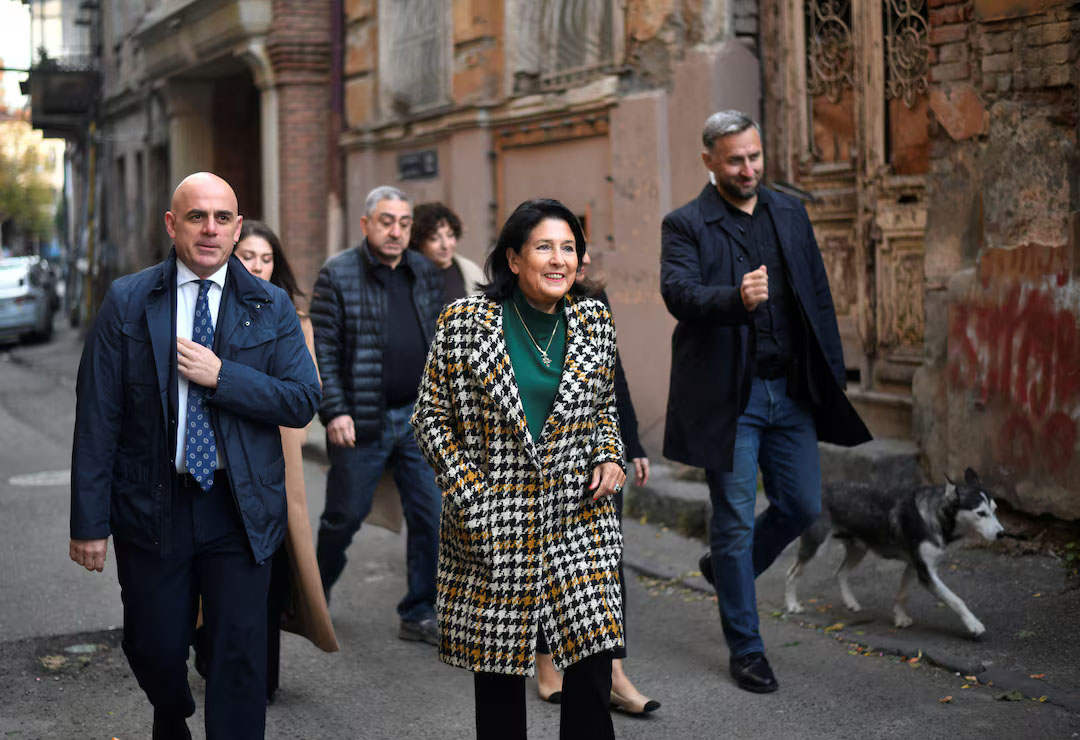TBILISI (Reuters) – Georgian President Salome Zourabichvili called on Sunday for people to take to the streets to protest the results of Saturday’s disputed parliamentary election, which the electoral commission said the ruling party had won.
The Georgian Dream party clinched nearly 54% of the vote, the commission said, as opposition parties contested the result and vote monitors reported significant violations.
Zourabichvili, a former Georgian Dream ally turned fierce critic of the ruling party, said she did not recognise the results and referred to the vote as a “Russian special operation”. She did not clarify whether she believed Russia had a direct role in the elections.
“It was a total fraud, a total taking away of your votes,” Zourabichvili told reporters, flanked by Georgian opposition party leaders.
Zourabichvili called on Georgians to protest in the centre of the capital, Tbilisi, on Monday evening “to announce to the world that we do not recognise these elections”.
The results, with almost all precincts counted, were a blow for pro-Western Georgians who had cast the election as a choice between a ruling party that has deepened ties with Russia and an opposition aiming to fast-track integration with Europe.
Georgian Dream, now headed for a fourth term in office, will take 89 seats in parliament, one less than it secured in 2020, the commission said, with four pro-Western opposition parties receiving 61 seats in total.
A series of violations were reported on Sunday by three separate monitoring missions, including the 57-nation Organiza-tion for Security and Cooperation in Europe (OSCE).
The groups said the alleged violations, including ballot-stuffing, bribery, voter intimidation and violence near polling stations, could have affected the result but stopped short of calling the outcome fraudulent.
“We continue to express deep concerns about the democratic backsliding in Georgia,” said Antonio Lopez-Isturiz White, head of the European Parliament’s delegation to the OSCE mission.
“The conduct of yesterday’s election is unfortunately evidence to that effect,” he told reporters.
In a post on X, European Council President Charles Michel called on Georgia’s electoral commission to fully investigate the reported violations.
“We reiterate the EU’s call to the Georgian leadership to demonstrate its firm commitment to the country’s EU path,” he said.
The electoral commission did not respond immediately to requests for comment, but on Saturday hailed a free and fair election. Prime Minister Irakli Kobakhidze said the observers’ conclusions showed there was no doubt about the election’s legitimacy.
Georgia’s four pro-Western opposition parties said they did not recognise the results, and some members pledged to boycott the new parliament and called for supporters to take to the streets.
Coalition for Change opposition party leader Nika Gvaramia called the vote “a constitutional coup” and a “usurpation of power”. His party cited two exit polls that showed the opposition winning a majority of seats in parliament.
The leader of the United National Movement opposition party, Tina Bokuchava, said the election had been “stolen”, calling for protests.
Georgian Dream’s reclusive billionaire founder Bidzina Ivanishvili, who campaigned heavily on keeping Georgia out of the war in Ukraine, hailed the party’s victory on Saturday night after its strongest performance since 2012.
Electoral commission data showed it winning by huge margins of up to 90% in some rural areas, though it underperformed in bigger cities.
Georgian Dream says it wants Georgia to join the European Union, though Brussels says the Caucasus country’s membership application is frozen over what it says are the party’s authoritarian tendencies.
It has pushed through a law on “foreign agents” and another curbing LGBT rights, both of which drew strong criticism from Western countries but were praised by some Russian officials.
For years, Georgia was one of the most pro-Western countries to emerge from the Soviet Union, with polls showing many Georgians disliking Russia for its support of two breakaway regions of their country.
Russia and Georgia fought a brief war over the rebel province of South Ossetia in 2008. Georgia was defeated.
But the election result poses a challenge to the EU’s ambition to bring in more ex-Soviet states.
Last week, Moldova voted narrowly to approve its EU accession in a vote that Moldovan officials said was marred by Russian interference.
An EU official told Reuters there was “a sense of disappointment” over the Georgian opposition’s performance, but Brussels was primarily concerned about a contested result leading to a standoff.
The German, Estonian, Latvian foreign ministries said they were concerned by the reports of electoral irregularities.
Hungary’s Prime Minister Viktor Orban, who was quick to congratulate Georgian Dream, planned to visit the country on Monday, the Georgian government said.









